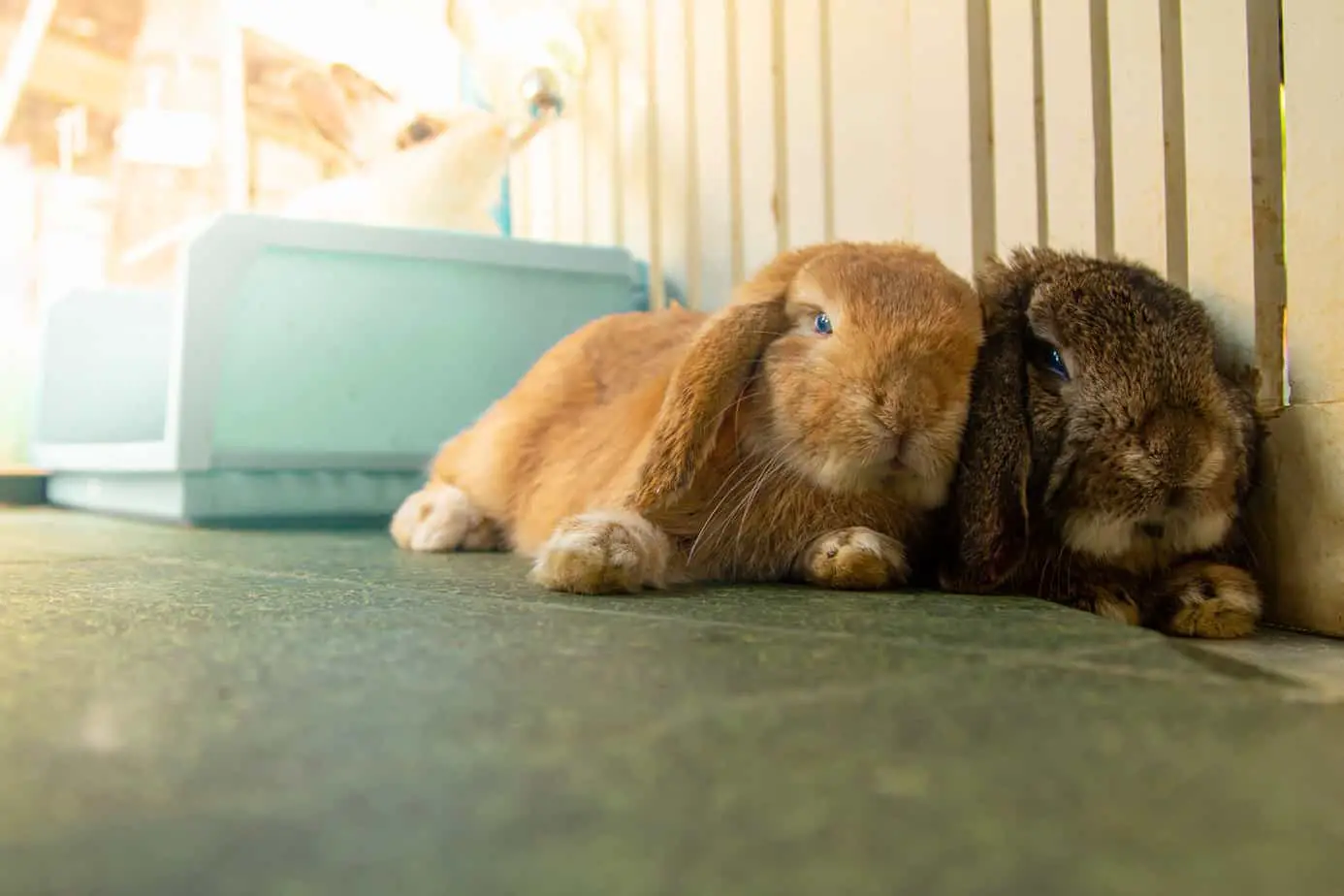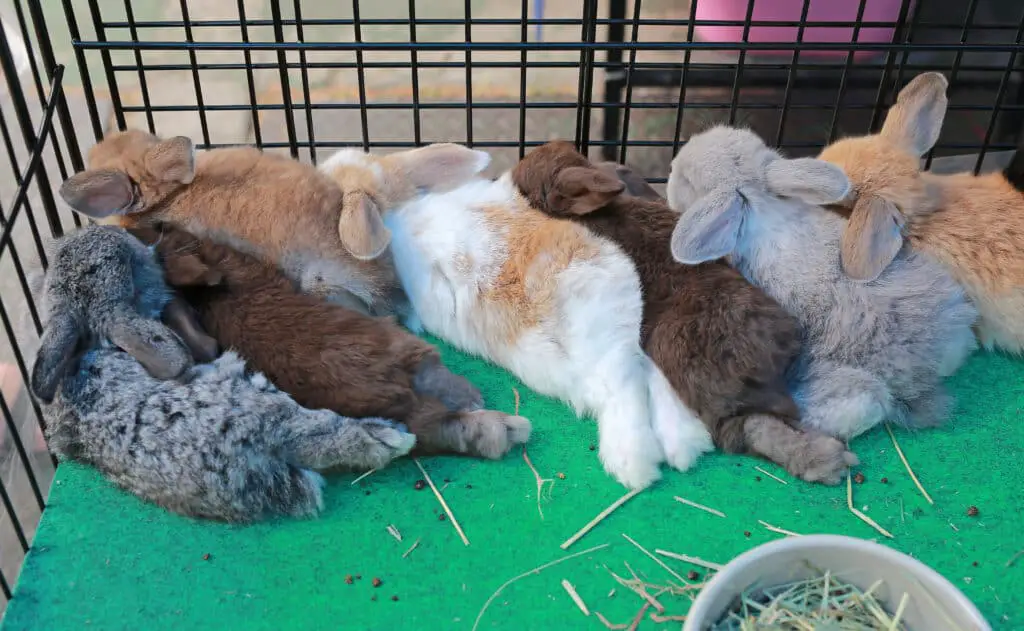
Whether you’re interested in getting a rabbit of your own or just find the little furballs irresistibly cute, curiosity about the creature’s habits can strike at the oddest times. Sleep is a crucial part of any animal’s routine, but what about bunnies? Where, when, and how much do they sleep?
Wild rabbits sleep in tunnels called warrens and are most active during sunrise and at twilight. Domestic rabbits sleep mid-morning and at night, wherever they feel safe in the home. Most rabbits take a series of naps each day totaling eight to twelve hours and prefer to sleep with other rabbits.
In this article I’ll be covering everything you need to know about how rabbits sleep, including where, when, how much, and much, much more. Read on to become a rabbit sleep expert!
Where Do Rabbits Sleep?
In the wild, rabbits dig deep and winding tunnel systems called warrens. Warrens reside up to nine feet underground and are great communal areas for rabbits to rest and make nests for their young. Warrens typically have many entrance and exit points so rabbits can easily flee to safety when threatened.
Domestic rabbits often find areas to sleep in the home that emulates the feeling of safety and closeness that warrens provide. As a result, pet rabbits often hide behind or under furniture to find a safe place to sleep. Rabbits naturally avoid open spaces, where they feel that predators can pose a threat.
If you own a large number of rabbits, they will naturally huddle together to sleep; sleeping in groups tells the bunnies that they’re safe from predators.
How Much Do Rabbits Sleep?
You’re probably familiar with sleeping eight or so hours a day, but rabbits aren’t! While rabbits are small furry mammals, their sleep habits differ wildly from humans.
On average, wild rabbits sleep about eight hours while domestic rabbits sleep around twelve hours each day. Unlike humans and many other animals, rabbits don’t sleep in a continuous session and tend to sleep in shorter increments to reduce the risk of being discovered by dangerous predators.
As we discuss in more detail later, domestic pet rabbits have drastically different sleeping habits that see them sleeping up to four hours more each day than wild rabbits.
When Do Rabbits Sleep?
Most rabbits sleep eight to twelve hours a day consisting of multiple long naps, most commonly during the middle of the day and at night. Rabbits are crepuscular and as a result, they are most active at daybreak and sundown with bursts of activity during the sunrise and twilight hours.
Deer are another example of a crepuscular animal. By contrast, humans are diurnal, meaning that we’re most active during the day. Common predators of rabbits, such as hawks and owls, can’t see well in the dim light conditions of twilight. This means rabbits have evolved to avoid these predators better.
Many people see rabbits sleep during the day and assume that they are nocturnal and awake all night.
Twilight hours are when rabbits naturally feel the safest to forage for food, giving them the best chance of avoiding predators out to make them lunch.
In most cases, your rabbit will seem to stay up past your bedtime and still be awake when you wake. However, in reality, a rabbit actually uses a system of frequent naps to provide a better framework for their needs.
The morning hours seem to be a more focused playing and eating time for most rabbits, while evening hours are when most rabbits are more relaxed and ‘wound down,’ so to speak. Tranquil rabbits in the evening have even to ‘watch’ television with their owners at these times.
Daily Routine of a Rabbit
A rabbit will wake up around dawn on an average day to eat, play, groom, and be social with their fellow bunnies. These activities go on until about midday when they return to their dens to sleep, rest, and otherwise relax. During this time, rabbits leave their duns to use the litter tray or eat a bit, but it’s a period of low activity.
The evening is when rabbits become the most active and emerge from their dens to again to play. As many rabbit owners have observed, bunnies are more relaxed and sociable in the evening twilight hours. If trying to bond with a rabbit, spending time with them in the evening is your best bet as they will often be the most tranquil and accepting of touch.
How To Know When a Rabbit Is Sleeping

Because rabbits often sleep with their eyes open, just observing your rabbit’s eyes just isn’t enough to determine if your rabbit is sleeping.
Signs your rabbit is sleeping include the following:
- The ears will be relaxed against the head. This isn’t a good indicator for lop-eared bunnies, unfortunately.
- Your rabbit curled up in a ball
- A Rabbit’s nose will twitch incessantly when they’re awake but are usually still when they’re asleep. Rapid breathing can be mistaken for this twitching, though.
- A Rabbit loafing around with outstreached legs
- A Slower respiration rate when asleep. When reaching of REM sleep, rabbits can appear to hyperventilate.
- Your rabbit burrowed in a corner
Rabbits like to hide when they sleep, so this can be a good indicator of whether the rabbit is asleep or not. Rabbits often make small jerking movements when they sleep as well; these are known as myoclonic movements.
Why Do Rabbits Sleep With Their Eyes Open?
Sometimes it’s clear that a rabbit is sleeping because it isn’t darting about and looking around, but its eyes are open.
Some rabbits sleep with their eyes open as a defense mechanism to deter would-be predators. Light reaches a rabbit’s brain faster when the eyes are open, alerting him to wake quickly. While not all rabbits sleep with open eyes, preditors are less likely to ambush a rabbit he believes is awake and alert.
Rabbits sleeping with their eyes open isn’t universal, however. Many rabbits rarely or never sleep with their eyes open; it’s all a matter of individual preference.
Your house bunny may seem to always sleep with his eyes closed, which is a sign that it loves and trusts you and its home. This likely means your rabbits are happy and content and are comfortable where they live.
How Many Hours Do Baby Rabbits Sleep?
Baby rabbits sleep twenty or more hours each day. For the first few weeks of life, baby rabbits commonly huddle together for warmth and only nurse once per day, sleeping the rest of the time.
It’s normal for young kits to sleep less as they approach maturity. In fact, most mature rabbits will only sleep six to eight hours a day anyway.
Do Rabbits Prefer To Sleep in Hot or Cold Temperatures?
Rabbits in the wild burrow into the cool earth to avoid the summer heat and conserve heat in the winter. Because they have a natural fur coat, it’s safe to assume rabbits prefer temperatures a little cooler than humans. Regardless, rabbits tolerate similar temperatures as humans, so your rabbit should be perfectly comfortable at most household temperatures.
Is It Safe To Sleep With your Rabbit?
Rabbits can be adorable, and it’s only natural to want to keep them close at all times, but is it okay to sleep with your pet bunny?
It is not usually safe to sleep with your rabbit. Rabbits are fragile and rolling over onto your pet would most likely be fatal. While some owners bond with their rabbits while sleeping, It’s better to let your rabbit sleep elsewhere, on the ground or in a cage.
This isn’t to say you can’t have your rabbit on your bed when you’re awake. In fact, playing and interacting with your bunny will help to improve its happiness and your bond with your furry pal. Regardless, they shouldn’t be on your bed with you when you are not directly supervising them.
Do Rabbits Sleep Alone or in Groups?
Most rabbits prefer to sleep in groups to maximize safety and security while resting. Rabbits are highly social and happiest when they have at least one other rabbit sleeping with them. While rabbits sleep best in groups, lone rabbits can sleep well when they feel safe and comfortable in their surroundings.
In the wild, rabbits sleep and snuggle together, giving a feeling of safety in the warren. This is somewhat emulated when multiple rabbits sleep together in a home or cage.
Even if you give a bunny lots of love and affection, it can still become depressed when in lack of company.
Rabbit Sleeping Positions

Rabbits will sleep in many creative and surprising positions that will often depend on temperature, comfort, and the overall feeling of security when winding down.
The most common sleeping positions in rabbits include:
The Curled Up Position
If it’s cold or a bit nippy where you live, you’re likely to see your rabbit sleeping in a curled-up position.
Sleeping curled up, covering their sensitive bellies with their furry body and paws, is a good way of conserving body heat, so you’ll often see rabbits, particularly babies, sleeping like this.
The Loafing Position
This is a common sleeping position with which all rabbit owners should be familiar.
The rabbit will splay its legs out in front and behind it, appearing supremely relaxed. This is a sign of contentment, but it also reduces heat.
The loafing position maximizes the amount of air contacting your rabbit and also separates the limbs allowing your pet to cool down.
The Snuggled Up Position
If you have more than one rabbit, chances are that you’ve seen them cuddling and sleeping together at some point, if not frequently!
Rabbits that have accepted each other and bonded will groom, play together, and freely sleep next to each other or in group huddles.
The Flopped Position
Rabbits that appear to have lost control of their legs, which are tucked underneath them, are said to flop.
Flopping is a sleeping position that means the rabbit is very relaxed and not at all worried about any threats in their environment.
In the wild, rabbits rarely flop because it would take time to get up and move their legs to run from danger.
Do Rabbits Sleep at night?
Rabbits do sleep at night, but not exclusively so. Rabbits tend to take naps in short increments throughout the day and night, becoming more active again until they tire. While these mammals can sleep at any point during the night, rabbits are crepuscular and most active at dawn and dusk to avoid predators.
Rabbits’ favorite times in nature are sunrise and twilight, so a little dim light may actually be ideal conditions for your rabbit. Experiment to find out what your bunny prefers.
The Sleep Habits of Rabbits
As with any animal, rabbits have some quirks that go along with the way they sleep.
Some of these can be alarming for a new rabbit owner or someone not familiar with the creatures, but none should be fussed over.
Pet Rabbits Sleep More
While most wild rabbits don’t sleep as much, domesticated pet rabbits that feel safe where they live will sleep much more often.
According to this study, rabbits kept as pets will sleep up to 12 hours each day! This sleep is broken up into chunks of time, similar to the sleep patterns of wild rabbits.
They’re Not Dead, Just Asleep
If you presently own a rabbit and have yet to see him truly relax and go to sleep, it may seem as though he’s stopped breathing.
However, your rabbit isn’t dead and is merely slumbering deeply. If your rabbit appears to have not moved in some time, feel free to check on him.
Rabbits Can Snore Too!
Just like humans, rabbits have the ability to snore – and it’s louder than you might expect! In some cases, this is a sign of respiratory problems, but some perfectly healthy rabbits snore too.
If you aren’t sure about your snoring bunny, it’s best to have a vet do a checkup to be on the safe side.
Final Thoughts
Hardwired with strong instincts to avoid predators, rabbits have changed their sleep routines to include a series of frequent naps interspersed with activity.
Rabbits prefer to sleep in group huddles and have many distinct, varied sleeping positions and habits that new pet rabbit owners should be aware of.
